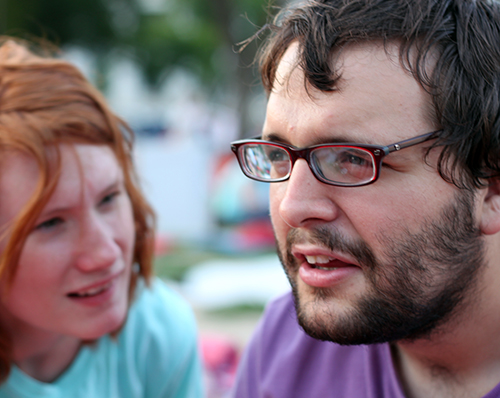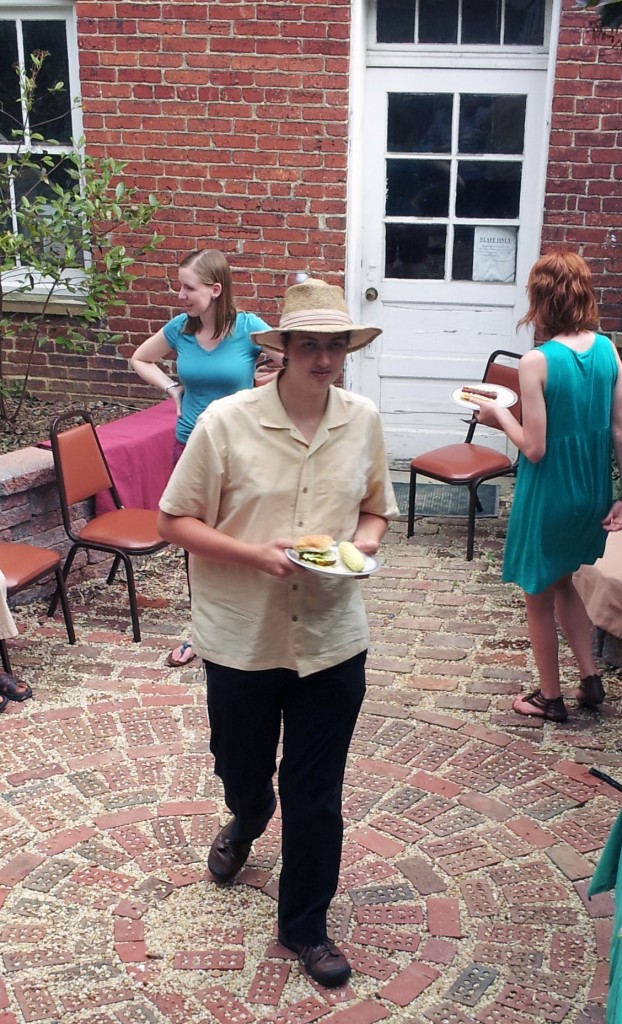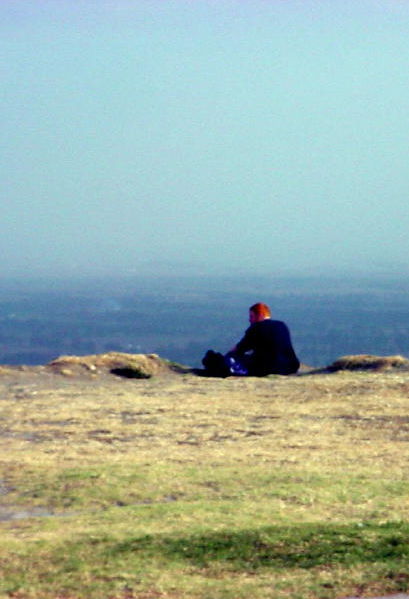 As a follower of Jesus, I feel called to share the good news that I have experienced. It’s news of a whole new way of living and being in relationship with God and other people. It’s a message of an upside-down kingdom, where all the supposedly important people of the world are humbled; meanwhile, the outsiders and misfits get invited to the party.
As a follower of Jesus, I feel called to share the good news that I have experienced. It’s news of a whole new way of living and being in relationship with God and other people. It’s a message of an upside-down kingdom, where all the supposedly important people of the world are humbled; meanwhile, the outsiders and misfits get invited to the party.
This is good news that I just can’t keep to myself. It’s a social reality where a life and power bigger than ourselves inspires us to joy, peace and action for justice. This good news is a reality that has to be experienced in community. It must be shared with others, or not experienced at all.
But I have a conundrum. I live in a society that is emerging out of many centuries during which the religious language and symbols of Christianity have been used to conquer, dominate, subvert and oppress. Far too often, the message of Jesus has been twisted. Jesus died homeless, penniless and alone on the Roman version of an electric chair, but he has suffered even more dreadfully over the last 2,000 years as his name and image have been co-opted to support the very types of domination systems that nailed him to the cross.
 After two millennia of abusive, false religion, many of us are often afraid to talk about God at all. So much evil has been done under the banner of religion; why not just leave it alone?
After two millennia of abusive, false religion, many of us are often afraid to talk about God at all. So much evil has been done under the banner of religion; why not just leave it alone?
In the circles I run in, religion is mostly considered a private matter for each individual to figure out on their own. Bringing our faith into public conversations often feels taboo. Better to talk about your sex life than your prayer life. Safer to invite your friends to go out drinking than to a prayer meeting. Some things are just too personal.
I’m one of those weird ones who regularly talks publicly about God, but even for me it often feels risky to share about what God has done for me. What if they think I am judging them? What if they think I am one of those Christians who hates gay people and supports war in the Middle East? What if they hold a different perspective and my faith experience offends them?

With such a potential minefield awaiting any public expression of faith, flying under the radar can seem like the best option. Maybe I’ll say, I’m thinking about you instead of I’m praying for you. Perhaps instead of speaking out of my own experience of Jesus in my life, I’ll tone it down and make vaguely spiritual statements. Everything happens for a reason.
I notice that vocal prayer is especially daunting. As our public conversations increasingly become no-God zones, it can even feel scary to speak openly about God within our Christian communities. As a newer Christian, learning how to pray out loud for others has felt really risky, and I’m still amazed when we pray for one another in our meetings at Capitol Hill Friends. To explicitly ask the Holy Spirit to come into our lives, heal our woundedness and equip us for positive action? That feels pretty radical!
And it is. Every time we invite God to work in our lives, we are participating in a fundamental restructuring of the cosmic order. But how much more radical would it be for us to take what we have learned in our little disciple community and apply it to the rest of life? If prayer is powerful in a meeting for worship, how much more impact might prayer have if I dared to practice it in my daily life? If the good news is worth sharing in the company of others who are seeking to be disciples, what impact might it make if I shared it with those who would benefit from it, even if they don’t go to church?

I want to acknowledge how intimidating this is for me, and for most of the people I know. I don’t want to be laughed at like Jehovah’s Witnesses or Mormon missionaries. I want people to feel comfortable around me, to think I’m a nice, normal guy. I certainly don’t want to make anyone feel oppressed, or triggered, or excluded. It’s really tempting just to focus on being a good person and leave God out of it.
But then I remember the kind of hell I was living in ten years ago, surrounded by nice people. I remember how desperately I needed to see demonstrated the good news of God’s transforming love, power and justice. In that place I was in, miserable and spiritually desolate, just being nice to me wouldn’t have been very nice at all. I thank God for those who went beyond decorum, who spoke to my soul, shared the message I needed to hear, and invited me into a new family in Jesus.
What has been your experience? Have you noticed a similar private/public divide when it comes to expressions of faith? Do you feel comfortable talking about God with strangers? Praying with friends in a restaurant? Inviting a co-worker to Bible study? Why or why not? Whether it is socially acceptable or not, how can we best be faithful as followers of Jesus?
I see Mr. Rogers from the PBS children’s show as a model. His work was a testimony of his religious life. And as a recent meme reminds us, he was very religious, yet never mentioned religion in his show. Instead he gave testimony with his work of the Holy Spirit living within him by his constant affirmation of the unique value that every child has.
We don’t need to talk about God if our actions demonstrate the presence of the Holy Spirit.
Sometimes it’s how you talk to God that is more important than talking about God…
The story is told that once a group of Mitnagdim (conventionally pious Jews) came across a band of Hasidim (unconventionally pious Jews) in an inn and began criticizing their piety.
“We get up every morning and recite our prayers according to the tradition, and then we go to work, making time to recite psalms as we toil, and then, after supper we go to the House of Study and spend hours debating and contemplating the word of God with seriousness! But what do you lazy loafers do?! You get up say your prayers when you’re ready, go to work, and after work you sit around drinking schnapps, listening to one another’s dreams and concerns, and then dancing and singing! And you think yourselves pious Jews! Ha!”
The Rebbe (Rabbi) of the Hasidim rose, smiled, and said, “My friends! When the Evil One comes to work each morning he thinks, “Wouldn’t it be something to bring a Jew to my side – the more pious the better!”
But when he shows up at our homes and shuls (synagogues) what does he see? A bunch of men, not learned or “obviously” Godly, simply acting like men do for we hide our piety in our daily living.
We pray with our work and our listening and our joy in God’s creation and one another – we drink to one’s another’s successes and cry for one another’s sorrows…we call God “Our Friend” and “Dad” and drink to His health and dance in His honor…and so the Evil One goes looking elsewhere, right to the homes and shuls of the obviously pious!”
And to his amazed audience the Rebbe lifted his schnapps glass and laughing said, “Brothers, will you join us in a toast to Our Friend?” And the whole company broke into wordless song, and dancing….
Good article! Thanks for sharing your thoughts, struggle and journey. I can understand some of what you feel. I was previously ensconced in the world of the activist Left prior to becoming born again. My hope for you is that you will continue to get built up in the Body of Christ by reading His Word, having quiet time and prayer time individually with the Lord (and daily, if possible). The Holy Spirit will lead you to speak or do…what He wants you to speak of do. Just be aware that you are now on the other side of the line. What do I mean by that? I don’t mean you have to be bombastic and arrogant and pound your fist on your chest, declaring Jesus is the Way, Truth and the Life and that no man will come to the Father but by Him. I do mean that now you have an understanding that He *is* the truth: He. Is. The. Truth. He asks you to do this: But in your hearts honor Christ the Lord as holy, always being prepared to make a defense to anyone who asks you for a reason for the hope that is in you; yet do it with gentleness and respect,1 Peter 3:15. I’m grateful that you are now a part of the family of Believers in Christ (our Messiah; our Savior). I pray for you, in His Name, that He will guide you in how to reflect His love, His truth and His message. He has a unique path for each of us, within in our families, circles and communities, that He desires for us to share His light. In fact, you may have been chosen to share His light specifically with your family and your circle…and you, more than another, may have a specific way of understanding your circle, that you could share Christ’s love. “Trust in the Lord with all your heart, and do
not lean on your own understanding. In all your ways acknowledge him,
and he will make straight your paths.”
I have a hard time identifying with the idea of a God taboo. I usually tell people I’m a Quaker even in casual conversation, and I openly discuss my faith. I talk often about God, the Bible, and the Inward Light, and vocally celebrate my heroes from Quaker history. People usually seem sincerely interested. I think the Quaker vocation still has something to offer, and one way to work that out is through honest, critical, and friendly interchange—even argument—in a spirit of love and accountability.
I understand I have an outgoing temperament, and that people who are shier than I am are significantly more cautious. You don’t strike me as the shy type though; that’s what puzzles me about this post. Maybe we have different root concerns. I experience Christ as the universal saving Light, a present and practical guide through the messy details of everyday life; I have little interest in highfalutin spirituality or expressive piety. [Sorry, I realize I’m grasping at straws. I have no idea what your interest is; if you had a message called forth by the Spirit, I can’t see *you* quailing before a taboo against God talk.]
What matters to me is devotion, discernment, and prophecy through plain speech. Those disciplines are way more upsetting to polite society (and to the slumbering church!) than mentioning “God”. But in my experience, unlikely people welcome their authentic exercise, even people who are uncomfortable with conventional religious expression.
One point I do identify with is the difficulty of public, vocal prayer with and for others. I thought that this was a skill passed down through evangelical culture that I missed out on, having grown up an outsider of the church. What I’ve found is that raising children can be a boot-camp for vocal prayer: your children don’t care that you’re not a pro, so you get a lot of practice without embarrassing yourself if you make a mistake. The willingness to make mistakes is critical to learning anything. Before you know it, you can offer a prayer for anyone without feeling foolish.
For me, the important question about vocal prayer, as with any ministry, is whether it is led by the Spirit.